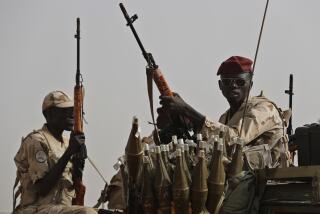Hundreds Killed in Rwandan Refugee Camp
- Share via
NAIROBI, Kenya — It was supposed to be a step toward returning Rwanda to normalcy. But suspicious, fearful and revenge-minded Rwandans were not ready for that, and the result has been a fresh outburst of bloodshed in the tormented country.
By late Saturday in the southwestern part of Rwanda, a death toll as high as several hundred was reported after 48 hours of chaos at a refugee camp inside the country’s borders.
Eyewitnesses said the killing came from all directions: The army killed refugees with gunfire, refugees killed each other with machetes, and the weak, including countless children, were killed in human stampedes.
Relief workers despaired at the rampage, which uprooted hopes that Rwandans might be ready to end the cycle of ethnic violence that has made their country one of the world’s most unhappy places for decades.
The latest spasm of violence occurred near the town of Kibeho, at a refugee camp that has been a growing source of frustration to the new government of Rwanda.
The government is dominated by ethnic Tutsis, the primary victims of last spring’s genocide by rival Hutus who were then in power.
The Hutus lost the war to a rebel Tutsi army later in the year. Many Hutus fled to neighboring countries--but a quarter of a million ended up in the southwestern portion of Rwanda, in camps established under protection of the French army and, later, the United Nations. About 80,000 Hutus were at the Kibeho camp.
Recently, the Rwandan government began agitating to close the camp, saying the country was at peace and ordinary refugees had nothing to fear from going home.
But among the Kibeho refugees are some who are not ordinary at all, but Hutus implicated in the systematic slaughter that claimed up to 1 million lives last year. The government and the victims’ families have become increasingly vocal in their demands that these suspects be brought to justice.
To coax refugees to clear out, the government first sought unsuccessfully to reduce shipments of relief food to the camp. Then, at midweek, the army moved on Kibeho.
Rather than willingly move, the refugees balked.
Relief workers suggested that soldiers deliberately panicked the refugees by encircling the camp.
Violence broke out Thursday. Shots were reported Friday night, and again Saturday, off and on, apparently as refugees sought to break through army lines and flee into the hills.
Soldiers were accused of firing into crowds, of bayoneting cornered refugees and looting their possessions.
Blame for the bloodshed also fell on young Hutu militiamen, who enforce their own rigid discipline inside the camp. They have repeatedly ordered refugees to resist the eviction, and apparently did so again this week, attacking fellow refugees who disagreed.
“The killing started around 4 a.m., when the displaced started macheteing each other. We had a lull until midday, and then with the gunshots there have been many dead,” U.N. doctor Carol Vaughan-Evans told Reuters news service.
In the capital, Kigali, the United Nations said it had no estimate of the number of dead.
But at the scene, Reuters correspondent Julian Bedford said he counted between 200 and 300 bodies.
The bloody encounter may have another dire consequence: strengthening radical elements among Hutus and Tutsis in this troubled region. Firebrands in both groups insist that there can never be trust between their peoples, as proved by clashes like the one in Kibeho. And they espouse a policy not of tolerance or reconciliation, but of domination.
More to Read
Sign up for Essential California
The most important California stories and recommendations in your inbox every morning.
You may occasionally receive promotional content from the Los Angeles Times.










